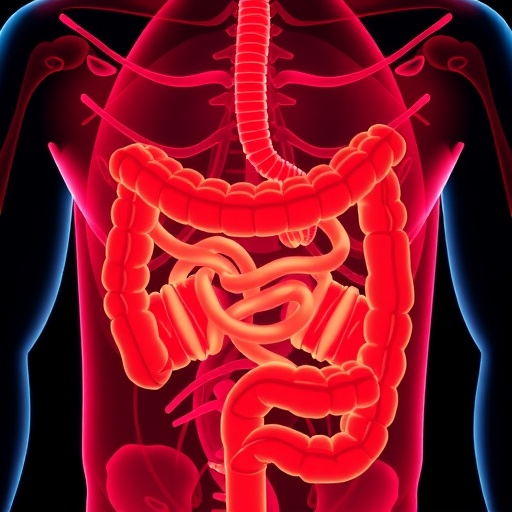In a groundbreaking study published in BMC Cancer, researchers have unveiled compelling evidence highlighting the significant influence of cardiovascular disease (CVD) on the incidence and prognosis of colorectal cancer (CRC), two of the most pervasive health burdens worldwide. This timely investigation sheds light on the intricate interplay between these diseases, which share common risk factors such as obesity, smoking, and diabetes, but until now, the effects of CVD on CRC outcomes remained largely unexplored.
Colorectal cancer ranks among the leading causes of cancer-related morbidity and mortality globally. Concurrently, cardiovascular disease remains the prime cause of death worldwide. Understanding their relationship is crucial, as co-occurrence of these conditions could seriously affect patient management and outcomes. While prior research has predominantly focused on how CRC impacts cardiovascular health, this new study reverses the lens, assessing how CVD contributes to CRC development and patient prognosis after diagnosis.
Utilizing data compiled from nine extensive databases including PubMed, Embase, Cochrane, Scopus, and others, the study encompasses literature spanning 25 years, from January 2000 through early 2025. The researchers employed advanced statistical analysis using Stata software to evaluate outcomes related to CRC diagnosis and postoperative prognosis, encompassing mortality and complication rates.
The meta-analysis incorporated 23 robust studies drawn from multiple countries and regions. Eleven studies representing a staggering total of over five million patients were analyzed for morbidity risk, while twelve studies encompassing more than 300,000 patients focused on postoperative prognosis. This unprecedented data breadth lends remarkable statistical power and reliability to their findings.
One of the study’s most striking results is the clear association between preexisting cardiovascular diseases and an elevated risk of developing colorectal cancer. The relative risk increase stood at 24%, with confidence intervals confirming statistical significance. This suggests that individuals with CVD are considerably more vulnerable to CRC, highlighting a need for heightened cancer surveillance within this population.
Postoperative complications were also scrutinized, with cardiovascular disease notably linked to a tripled risk of developing arrhythmias following surgery. Arrhythmias pose critical challenges during recovery, potentially amplifying mortality risks and delaying convalescence. However, despite this correlation, the study did not find significant associations between CVD and other postoperative complications, indicating that arrhythmia remains the primary cardiovascular concern post-CRC surgery.
Mortality outcomes further underscored the dark synergy between these conditions. Patients with concomitant cardiovascular disease faced a 56% higher risk of all-cause mortality following their colorectal cancer diagnosis. This sobering statistic reinforces the reality that cardiovascular health profoundly impacts cancer patient survival, necessitating integrated clinical approaches for managing these comorbidities.
Delving deeper into specific cardiovascular disorders, heart failure emerged as a particularly potent risk factor. Not only did heart failure increase the likelihood of developing colorectal cancer by nearly 40%, but it also heightened all-cause mortality risk by 68% in patients already diagnosed with CRC. Such findings illuminate the critical impact of impaired cardiac function on cancer progression and patient resilience.
Intriguingly, the study revealed pronounced gender-specific variations. Among female patients, heart failure and heart failure with preserved ejection fraction (HFpEF) were strongly associated with colorectal cancer incidence. In fact, the relative risks for these conditions in women were over twice as high compared to the general cohort. This signals an urgent need to explore gender-based biological and hormonal mechanisms that may drive these disparities.
The convergence of cardiovascular disease and colorectal cancer underscores complex physiological pathways that await further elucidation. Inflammatory processes, oxidative stress, metabolic dysregulation, and shared lifestyle-related risk factors likely contribute to this interrelation. The authors call for intensified research efforts to unravel these mechanisms, which could pave the way for novel therapeutic targets and improved prognostic tools.
In clinical practice, these findings advocate for heightened vigilance in monitoring colorectal cancer patients with existing cardiovascular conditions. Comprehensive care models that incorporate cardiology alongside oncology can optimize patient outcomes through tailored treatment regimens, closer surveillance, and mitigation of cardiovascular risks during cancer therapy.
The study also highlights the importance of preventive strategies targeting shared risk factors. Smoking cessation, weight management, diabetes control, and physical activity promotion not only reduce cardiovascular disease burden but might also attenuate colorectal cancer risks, providing a dual benefit in public health campaigns.
While the study presents robust epidemiological evidence, the authors acknowledge certain limitations inherent in meta-analyses, including potential heterogeneity among included studies and confounding factors. Nevertheless, the consistent associations detected across diverse populations enhance the validity of conclusions.
This research marks a pivotal step towards integrated understanding of multimorbidity in chronic diseases, underscoring that cardiology and oncology disciplines cannot operate in silos when addressing patient care. The undeniable overlap between cardiovascular pathology and colorectal cancer calls for inter-specialty collaboration in both research and clinical domains.
Ultimately, unravelling the biological underpinnings of how cardiovascular disease influences colorectal cancer progression may unlock novel insights vital for personalizing treatment. As healthcare moves toward precision medicine, these findings could inform risk stratification models, ensuring that patients receive bespoke therapies that consider their comprehensive health status.
In summary, the intersection between cardiovascular disease and colorectal cancer, as revealed by this large-scale analysis, opens new avenues for research and treatment optimization. The heightened risks in patients with heart failure and observed gender disparities signal critical areas for focused investigation. As our understanding deepens, the potential to improve survival and quality of life for millions afflicted by these debilitating conditions grows ever brighter.
By shedding light on this vital, yet underexplored, nexus, scientists have laid the groundwork for advancing multidisciplinary strategies to tackle two of humanity’s most daunting health challenges. The study’s comprehensive approach and compelling results are poised to influence clinical guidelines, public health policies, and future biomedical research globally.
Subject of Research:
The relationship between cardiovascular disease and colorectal cancer morbidity and prognosis.
Article Title:
Impact of cardiovascular disease on colorectal cancer morbidity and prognosis
Article References:
Li, SQ., Wang, L., Liu, XY. et al. Impact of cardiovascular disease on colorectal cancer morbidity and prognosis. BMC Cancer 25, 1448 (2025). https://doi.org/10.1186/s12885-025-14905-3
Image Credits:
Scienmag.com
DOI:
https://doi.org/10.1186/s12885-025-14905-3





